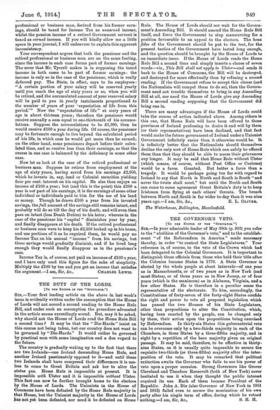THE DUTY OF THE LORDS. [re Tar Eorros or res
"Srecraros."]
Sic,—Your first leading article on the above in last week's issue is evidently written under the assumption that the House of Lords will not accord a second reading to the Home Rule
• and under such an assumption the procedure advocated in the article seems exceedingly sound. But, may it be asked, why should not the House of Lords read the Home Rule Bill a second time ? It may be that the " Die-Hards " insist on this course not being taken, but our country does not want to be governed by "Die-Hards." It would rather be governed by practical men with some imagination and a due regard to the future.
The country is gradually waking up to the fact that there are two Irelands—one Ireland demanding Home Rule, and another Ireland passionately opposed to it—and until these two Irelands shall have composed their differences it is use- less to come to Great Britain and ask her to alter the status quo. Home Rule is impossible at present. It is impossible with Ulster and it is impossible without Ulster. This fact can now be further brought home to the electors by the House of Lords. The Unionists in the House of Commons have been defeated by the Home Rule majority in that House, but the Unionist majority in the House of Lords has not yet been defeated, nor need it be defeated on Home Rule. The House of Lords should not wait for the Govern. ment's Amending Bill. It should amend the Home Rule Bill itself, and force the Government to stop manoeuvring for a position favourable to an appeal to the electors. The bolus fides of the Government should be put to the test, for the present tactics of the Government have lasted long enough, and the question should be brought by the House of Lords to an immediate issue. If the House of Lords reads the Home Rule Bill a second time and simply inserts a clause of seven words—viz., This Bill shall not apply to Ulster—and sends it back to the House of Commons, the Bill will be destroyed, and destroyed far more effectually than by refusing a second reading. If the Government refuse to accept this clause (and the Nationalists will compel them to do so), then the Govern- ment need not trouble themselves to bring in any Amending Bill at all, nor need the House of Lords give any Amending Bill a second reading supposing that the Government did bring one in.
There are many advantages if the House of Lords could take the course of action indicated above. Among others is this one, that Home Rule will have been offered to those provinces of Ireland professing to desire it and will by them (or their representatives) have been declined, and that fact would make the future government of Ireland under a Unionist Government infinitely easier than it otherwise would be. It is infinitely better that the Nationalists should themselves decline the only sort of Home Rule which can safely be offered them than that they should be able to nurse their grievances any longer. It may be said that Home Rule without Ulster (which means, of course, without Post Office or Customs) would be a farce. Granted- But better a farce than a tragedy. It would be perhaps going too far with regard to Ireland to say that North is North and South is South " and never the twain shall meet," but until the North and South can come to some agreement Great Britain's duty is to keep Irishmen from flying at each others' throats. The breach between North and South is far wider to-day than it was nine
years ago—I am, Sir, Ste., E. L. Otavzs. The Waterhouse, Bollington, Macclesfield.










































 Previous page
Previous page